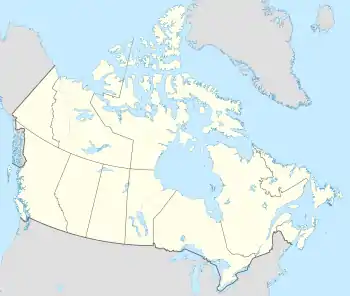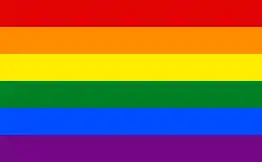Same-sex marriage in Newfoundland and Labrador
Same-sex marriage in Newfoundland and Labrador has been legal since December 21, 2004, when the province was ordered to issue marriage licences to same-sex couples.
|
LGBT portal |
|---|
Court ruling
On November 4, 2004, two lesbian couples who had been denied marriage licences (Jacqueline Pottle and Noelle French, and Lisa Zigler and Theresa Walsh) filed a lawsuit, Pottle et al v. Attorney General of Canada et al, against the federal and provincial governments, requesting that the Government of Newfoundland and Labrador be ordered to issue marriage licences to same-sex couples.
Newfoundland and Labrador thus became the eighth of Canada's thirteen provinces and territories to have such a lawsuit filed. The Government of Canada had recently ceased to oppose such lawsuits. The Provincial Government also did not oppose the lawsuit;[1][2] the provincial Attorney General, Tom Marshall, announced that his office will not oppose the suit.[3][2] The case began on December 13, and was heard starting on December 20, 2004.[1]
Justice Derek Green took only one day to decide to follow the precedents from the other provinces and Yukon and ordered that same-sex couples in Newfoundland and Labrador be issued marriage licences, thus making same-sex marriage legal in Newfoundland and Labrador. Attorney General Tom Marshall indicated that the government would comply immediately. Ms. Pottle and Ms. French were married on December 23 by Andy Wells, Mayor of St. John's.[4][5]
However, some officiants, including Gander Mayor Claude Elliott and Botwood Mayor Jerry Dean, said that they would refuse to officiate at such ceremonies.[5] The Provincial Government warned its civil marriage commissioners, such as mayors or justices of the peace, that they must perform these marriages or resign, as the marriages are now legal.[5] This mirrored an earlier move by the Manitoba Provincial Government. Desiree Dichmont, a marriage commissioner, resigned from her post following the legalisation of same-sex marriage in the province, citing her religious beliefs. She later filed a complaint with the province's human rights commission arguing that she had been unfairly discriminated against because of her religion. The commission determined in 2015 that the province had been justified in terminating her appointement. Dichmont died in 2016, age 90, and lawyers representing her estate appealed the decision. In January 2021, Supreme Court Justice Vikas Khaladkar ruled in favour of the human rights commission and agreed that the Provincial Government had the right to require her to resign unless she agreed to perform marriages to all couples. Khaladkar ordered Dichmont's estate to pay costs to the province and the human rights commission.[6]
Gordon Young, an evangelical pastor of the First Assembly Church of St. John's, asked the Newfoundland and Labrador Court of Appeals to allow him to appeal the ruling that legalized same-sex marriage. His case did not proceed.[2]
Provincial legislation
In April 2002, the Newfoundland and Labrador House of Assembly approved amendments to the Adoption Act to allow same-sex couples to adopt children jointly.[7]
In May 2009, the House of Assembly amended the Marriage Act by replacing the expression "husband and wife" with "spouses".[8] Further legislation passed in December 2009 changed the definition of "spouse" to include same-sex couples in other acts, namely the Family Law Act.[9]
References
- "thebacklot.com - Corner of Hollywood and Gay". 365gay.com. Retrieved 2014-04-05.
- Same-sex marriage in Canada: Newfoundland and Labrador
- "thebacklot.com - Corner of Hollywood and Gay". 365gay.com. Retrieved 2014-04-05.
- "thebacklot.com - Corner of Hollywood and Gay". 365gay.com. Retrieved 2014-04-05.
- Same-sex ultimatum given to commissioners
- Bradbury, Tara (29 January 2021). "Newfoundland and Labrador Supreme Court rules marriage commissioner didn't have the right to discriminate against same-sex couples". The Telegram.
- NEWFOUNDLAND OKS GAY ADOPTION
- "CHAPTER M-1.02 AN ACT RESPECTING MARRIAGE IN THE PROVINCE". Newfoundland and Labrador House of Assembly. Retrieved February 12, 2016.
- "CHAPTER 31 AN ACT TO AMEND THE LAW WITH RESPECT TO THE DEFINITION OF SPOUSE". Newfoundland and Labrador House of Assembly. Retrieved February 12, 2016.
External links
- "Same-sex marriage in Newfoundland and Labrador, Canada". Religious Tolerance.

